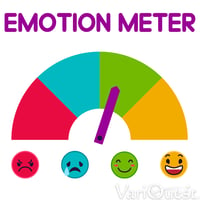 An emotion meter is a great way to gauge what mood your students are feeling in the moment! Whether it's for posting in the classroom, calming corners, or student journals, this tool can be created large or small for group or individual discussions.
An emotion meter is a great way to gauge what mood your students are feeling in the moment! Whether it's for posting in the classroom, calming corners, or student journals, this tool can be created large or small for group or individual discussions.
With social-emotional learning for students a topic of the utmost importance as children grow and mature, use these simple exercises to give students meaningful tools for managing and working through their feelings!
 VariQuest customers can download this template for free on the VariQuest Resource Center as a poster for the Perfecta® Poster Design System or an individual piece for the Motiva® 400 Specialty Printing System!
VariQuest customers can download this template for free on the VariQuest Resource Center as a poster for the Perfecta® Poster Design System or an individual piece for the Motiva® 400 Specialty Printing System!
For the Class
Print the emotion meter as a poster using your VariQuest Perfecta Poster Design System and post it at the front of the class. Divide students into small groups and assign each group "angry/calm" or "sad/happy"
- "Angry/Calm" Groups: Have students talk about what it might look like when someone is angry. For example, a person may have their arms crossed, or they may use a louder voice than normal. Then have students brainstorm ways that those who feel angry can find their calm again. It may help to give students some examples like "taking a walk" or "finding a quiet place" to start. Finally, have them make a list of ways those who are calm might help someone who is angry feel better again - like sharing a snack or simply giving them space to cool down.
- "Sad/Happy" Groups: Have students talk about what it might look like when someone is sad. For example they may be crying, or may use a quieter voice than normal. Then have students brainstorm ways that those who feel sad can find their happy again. Some examples may include writing in a journal or talking to a friend about what is making them sad. Finally, have students make a list of ways those who are happy might help someone who is sad feel better again - like inviting them to play a game or simply lending a listening ear.
Add student answers to the poster, as a list of ideas to be displayed in your classroom calming corner, or in a spot where you can refer back to it when students need a check-point for their day.
For the Individual
Following your class exercise on understanding each of the feelings and how we can feel better when we're angry or sad, try these individual check-ins each morning (or however often it makes sense for your class).
VariQuest Customers: print and laminate the emotion meter on 4" card stock (and follow the directions in the video to affix your dial) using the VariQuest Motiva 400 Specialty Printer to include in students' individual desks or notebooks.
- Have students take their personal emotion meter (with dial) out of their desks and turn the dial to how they're feeling in the moment. They can then either set it on their desks for you as the teacher to walk around and view, or if you want a little more privacy, have everyone face the front of the room and hold it up in front of them so only you can see it. Use this information to guide your next tasks of the day, and use breaktime opportunities to speak to, or help any students who might need a little extra support.
-OR-
- Have students insert their personal emotion meter (with dial) into a special envelope slot they create in a social-emotional wellbeing journal. Each day when they go to create an entry, they should move the dial to the emotion they're feeling, use that emotion as the header for their entry, then write about what events have caused them to feel that way. Have students turn in their notebooks for you to review during worktime, as a gauge for how everyone is feeling, so you can address any problems or issues your students might be encountering.
We hope we've given you some ideas for talking about student feelings in your classroom! For more on how the VariQuest Visual and Kinesthetic Learning Suite, complete with our Engage Every Learner® Content, can help with these and other social-emotional support activities, request a no-obligation demonstration with one of our expert education consultants today!



 An emotion meter is a great way to gauge what mood your students are feeling in the moment! Whether it's for posting in the classroom, calming corners, or student journals, this tool can be created large or small for group or individual discussions.
An emotion meter is a great way to gauge what mood your students are feeling in the moment! Whether it's for posting in the classroom, calming corners, or student journals, this tool can be created large or small for group or individual discussions.
